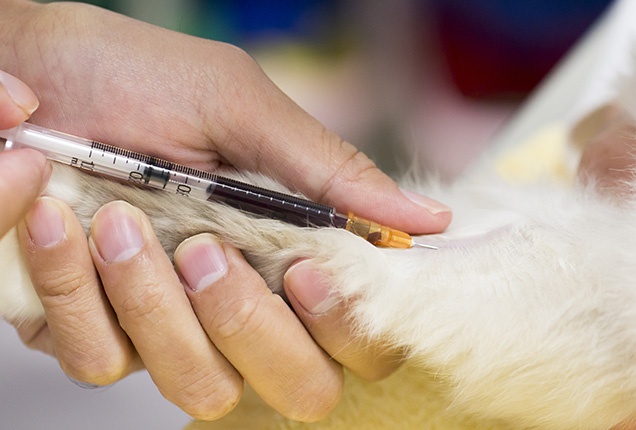Laser therapy offers a cutting-edge approach to veterinary medicine. LASER stands for Light Amplification by Stimulated Emission of Radiation. Laser therapy uses laser light beams to transfer energy to tissues, improving metabolism and thus stimulating the healing process. Little known in France, this painless, non-toxic and non-invasive technique is well established in the United States, where it is used in traumatology and physiotherapy.
Several studies have shown the many benefits of laser therapy on cells: A photochemical effect by absorption of the light wavelength, which reduces inflammation, swelling (oedema) and pain. A photothermal effect that warms the tissues, activating blood flow and encouraging the removal of waste products to speed up healing. A photomechanical effect triggered by heat that stimulates cell activity.
Laser therapy treats a wide range of conditions, including:
Musculoskeletal or neurological pain
Laser therapy helps with trauma or disc problems, as the anti-inflammatory and analgaesic effects reduce pain and improve the patient’s quality of life.
Degenerative joint disease or osteoarthritis
Laser therapy effectively reduces inflammation and pain in pets suffering from osteoarthritis, significantly improving their well-being.
Tendon and muscle injuries
Laser therapy promotes muscle fibre repair while also reducing swelling and pain, helping pets recover from tendonitis and muscle tears.
Bruises and haematomas
Laser therapy’s powerful ability to reduce swelling and inflammation helps effectively drain fluids and speed up the healing of bruises (haematomas), promoting faster tissue repair.
Lick granulomas, wounds, scars, etc.
The stimulating effect of laser therapy not only helps to heal lick granuloma lesions more quickly, but also reduces the inflammation that often aggravates them.
Stomatitis & gingivitis
Laser therapy significantly improves the quality of life for pets with stomatitis and gingivitis, as the anti-inflammatory and pain-relieving properties of laser therapy effectively minimise swelling.
Depending on your pet’s individual needs, ask Dr Pignolet for advice. After an initial consultation, she will work with you to determine the most appropriate treatment requirements and frequency of laser therapy sessions. You can attend each session (wearing protective goggles) to comfort your pet. Even exotics can benefit from laser therapy to treat various health conditions that affect them.





